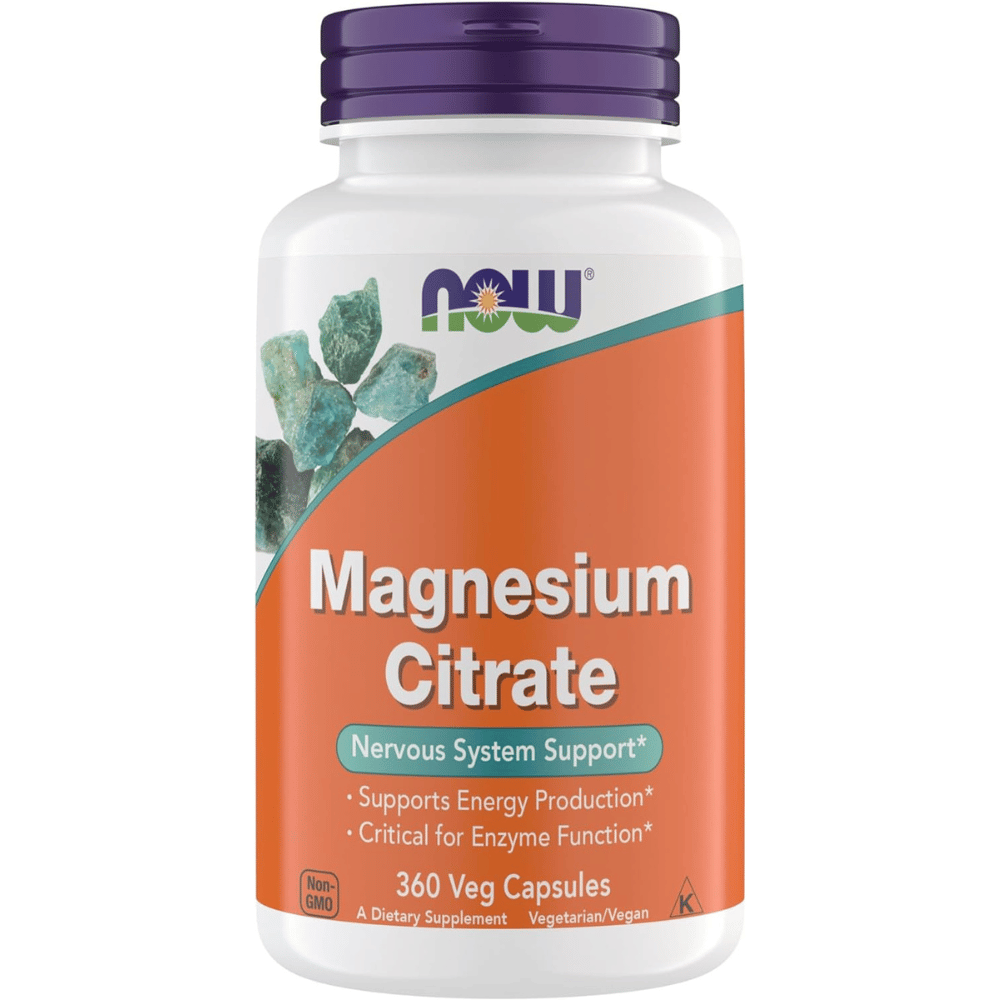Key Takeaways:
- Identifying the most effective form of magnesium for migraine relief is crucial for sufferers.
- Magnesium glycinate, citrate, and threonate are among the top choices due to their high bioavailability and ability to cross the blood-brain barrier.
- Proper dosage and consistent supplementation can significantly reduce migraine frequency and severity.
Magnesium, the fourth most abundant mineral in the human body, plays a pivotal role in numerous biological functions, including nerve function, energy production, and blood pressure regulation. For migraine sufferers, magnesium supplementation has emerged as a natural remedy with the potential to alleviate migraine symptoms and prevent migraines. However, with several different magnesium supplements available, choosing the best magnesium for migraines can be daunting. This review delves into the various forms of magnesium and their efficacy in migraine management.
Magnesium Glycinate: The Soothing Compound
Magnesium glycinate, a chelated form of magnesium bound to the amino acid glycine, is renowned for its ability to promote sleep quality and cognitive function. Its high bioavailability and gentle effect on the stomach make it a preferred choice for migraine prevention. The presence of glycine also enhances the calming effects of magnesium, making it an excellent option for those who suffer from migraines associated with stress or anxiety.
Magnesium Citrate: The Popular Choice
Magnesium citrate, formed by combining magnesium with citric acid making it more bioavailable, is a common form of magnesium supplementation. It is well-known for its laxative properties and is often recommended for those with constipation. For migraine relief, magnesium citrate is valued for its efficiency in raising magnesium levels in the body, which can be beneficial for those with a deficiency linked to migraine attacks.
Magnesium Threonate: The Brain Booster
Magnesium threonate is unique in its ability to cross the blood-brain barrier, potentially offering direct benefits to brain health and migraine relief. This form of magnesium is particularly effective for cognitive function and may be the best option for individuals experiencing migraines with aura or migraines that impact their cognitive abilities.
Magnesium Oxide: The Standard Supplement
Magnesium oxide is a common form of magnesium found in many supplements. While it has a high elemental magnesium content, its poor bioavailability often makes it a less effective magnesium supplement for migraine relief. However, it is still used in some migraine medications due to its cost-effectiveness and availability.
Magnesium Sulfate: The Intravenous Option
Magnesium sulfate is typically administered intravenously in clinical settings for acute migraine attacks. It is not commonly used for daily supplementation due to its form and method of administration. However, it has been shown to provide rapid migraine relief in emergency situations.
Magnesium Chloride: The Topical Solution
Magnesium chloride can be found in topical magnesium products such as magnesium lotions and oils. Transdermal magnesium is an alternative for those who experience gastrointestinal discomfort from oral supplements. While the efficacy of topical magnesium for migraine prevention is still under investigation, it offers a different route of administration that may benefit some individuals.
Magnesium Malate: The Energy Enhancer
Magnesium malate combines magnesium with malic acid, a compound involved in the Krebs cycle for energy production. This form is often recommended for individuals with chronic fatigue syndrome in addition to migraine sufferers. Its energy-boosting properties can be particularly helpful for those whose migraines are accompanied by fatigue.
Magnesium Taurate: The Cardiovascular Helper
Magnesium taurate is a chelated form of magnesium bound to the amino acid taurine, known for its cardiovascular benefits. This combination may aid in blood pressure regulation, which can be advantageous for migraine sufferers with vascular concerns.
Magnesium Lactate: The Digestive Gentleman
Magnesium lactate is created by combining magnesium with lactic acid and is considered to be gentler on the digestive system than other forms. It is a suitable option for those who have sensitive stomachs but still require migraine relief from magnesium supplementation.
Magnesium Bisglycinate: The Enhanced Bioavailability Factor
Magnesium bisglycinate, often recognized for its superior absorption, stands out among magnesium compounds due to its chelated form. This essential mineral is bound to glycine, an amino acid that facilitates its passage through the intestinal wall, making it one of the more bioavailable forms of magnesium. Unlike some common forms of magnesium supplements, magnesium bisglycinate is less likely to cause gastrointestinal discomfort, which can be a significant advantage for individuals with sensitive digestive systems or those who require higher doses for migraine management.
The enhanced bioavailability of magnesium bisglycinate means that it can be more effective in efficiently raising magnesium levels in the body. This is particularly important for migraine sufferers, as maintaining optimal magnesium levels is crucial for neurological health. Studies suggest that magnesium bisglycinate may cross the blood-brain barrier more readily than other forms of magnesium, potentially offering more direct benefits for migraine prevention and relief. When choosing a supplement like Magwell magnesium zinc, which often includes magnesium bisglycinate, consumers are likely to experience better outcomes due to the high-quality formulation.
Magnesium's Role in Neurological Health and the Blood-Brain Barrier
Magnesium plays a pivotal role in maintaining neurological health, particularly in its interactions with the blood-brain barrier (BBB). This semi-permeable membrane is crucial for protecting the brain from potential toxins while allowing essential nutrients to pass through. Magnesium's ability to modulate the permeability of the BBB is of particular interest to researchers. Studies suggest that adequate levels of magnesium may reinforce the barrier's integrity, potentially reducing the frequency and severity of migraines by limiting the influx of inflammatory substances that can trigger migraine episodes.
Furthermore, magnesium's influence on the blood-brain barrier extends to its vasodilatory properties, which can improve cerebral blood flow. This is significant because disrupted blood flow is a known factor in the pathophysiology of migraines. By ensuring the proper function of the BBB and promoting healthy blood circulation within the brain, magnesium stands out as a key mineral in the fight against migraines. However, the exact mechanisms by which magnesium interacts with the BBB remain a subject of ongoing scientific inquiry, underscoring the complexity of its role in neurological health.
Magnesium's Role in Modulating the Blood-Brain Barrier
Magnesium plays a pivotal role in maintaining the integrity of the blood-brain barrier, a critical defense mechanism of the central nervous system. This barrier selectively permits certain substances to pass from the bloodstream into the brain while blocking others, thus protecting neural tissue from toxins and pathogens. Adequate levels of magnesium are essential for the proper functioning of this barrier. Studies have shown that magnesium can influence the tight junctions between endothelial cells that make up the blood-brain barrier, potentially reducing the risk of migraine attacks by stabilizing the barrier's permeability.
Conversely, a magnesium deficiency may compromise the blood-brain barrier's effectiveness, potentially exacerbating neurological conditions such as migraines. The relationship between magnesium and the blood-brain barrier is complex and multifaceted, with research indicating that magnesium's vasodilatory effects on cerebral blood vessels could also play a role in migraine prevention. By ensuring the blood-brain barrier remains selective and functional, magnesium supplementation may offer a protective effect against the onset of migraine headaches, highlighting the importance of maintaining optimal magnesium levels for neurological health.
The Consequences of Poor Quality Magnesium Supplements on Blood-Brain Barrier Function
When it comes to magnesium supplements, not all products are created equal. Poor quality supplements may not only be ineffective but could also pose risks to the blood-brain barrier's health. Low-grade magnesium supplements often contain impurities or are formulated in a way that hinders their absorption, rendering them less capable of delivering the benefits required for blood-brain barrier maintenance. In some cases, these inferior products may even introduce harmful substances into the bloodstream, which can indirectly affect the blood-brain barrier's integrity and potentially trigger or worsen migraine symptoms.
Consumers must be discerning when selecting a magnesium supplement, as the consequences of ingesting poor-quality options can extend beyond simple inefficacy. A compromised blood-brain barrier due to substandard supplementation can lead to increased neural inflammation and susceptibility to neurological disorders. Therefore, individuals seeking migraine relief through magnesium should prioritize high-quality supplements with proven bioavailability and purity, ensuring that they support, rather than undermine, the critical functions of the blood-brain barrier.
The Impact of Poor Quality Magnesium Supplements on Health
The market is flooded with supplements, and not all magnesium products are created equal. Poor quality magnesium supplements can have several detrimental effects on health, including reduced efficacy and potential contamination with harmful substances. These substandard products may not provide the expected relief from migraines, as they often contain lower levels of bioavailable magnesium, which is crucial for crossing the blood-brain barrier and exerting its therapeutic effects. Moreover, impurities and additives found in low-quality supplements can lead to adverse reactions, further exacerbating migraine symptoms rather than alleviating them.
Consumers seeking migraine relief should be vigilant in selecting high-quality magnesium supplements. It is essential to choose products that have undergone rigorous testing and quality control measures to ensure purity and potency. Reputable brands often provide certificates of analysis and adhere to good manufacturing practices (GMP). By investing in a high-quality magnesium supplement, individuals can increase their chances of obtaining the full range of benefits that magnesium has to offer for migraine prevention and treatment, while minimizing the risks associated with contaminants and poor absorption.products and better support their health needs, particularly when managing conditions like migraines.
The Significance of Magnesium Salts in Migraine Alleviation
Magnesium salts, such as magnesium chloride, magnesium sulfate, and magnesium hydroxide, are commonly used in various therapeutic contexts, including migraine relief. These salts dissolve into magnesium and respective anions in the body, contributing to the essential mineral's availability. Magnesium hydroxide, for instance, while often used as an antacid or laxative, can also contribute to the overall magnesium intake, albeit with a lower absorption rate compared to chelated forms like magnesium bisglycinate.
However, not all magnesium salts are created equal when it comes to crossing the blood-brain barrier and efficiently raising magnesium levels in the central nervous system. Poor quality supplements may contain less absorbable magnesium salts, leading to suboptimal results and potential waste of resources. Consumers must discern between high-quality and poor-quality supplements, as the efficacy of magnesium in migraine prevention can be significantly influenced by the form of magnesium chosen. High-quality magnesium salts in well-formulated supplements can play a pivotal role in managing migraines by ensuring adequate magnesium bioavailability.
Addressing Magnesium Deficiency
A magnesium deficiency can contribute to migraine attacks, making it essential to address magnesium deficiency through diet or supplementation. Foods rich in magnesium include leafy greens, nuts, seeds, and whole grains. However, for those unable to meet their magnesium needs through diet alone, supplementation becomes necessary.
How Much Magnesium for Migraine Relief?
The recommended dosage of magnesium for migraine prevention varies, but the American Headache Society suggests a range of 400-500 mg per day. It is important to consult with a healthcare provider before starting any supplement regimen, especially for individuals taking migraine medications or those with kidney issues.
Magnesium Supplementation and Migraine Medications
When taking magnesium supplements for migraine relief, it is crucial to consider potential interactions with migraine medications. Some medications may affect the absorption of magnesium, while high doses of magnesium can have a laxative effect, potentially altering the effectiveness of other drugs.
Choosing an Effective Magnesium Supplement
When selecting an effective magnesium supplement, consider factors such as bioavailability, elemental magnesium content, and the presence of additional compounds that may enhance the supplement's effects. Products like Bioptimizers Magnesium Breakthrough Supplement and BioEmblem Triple Magnesium Complex are designed to provide a balanced blend of magnesium forms for optimal efficacy.
Magnesium Supplements for Specific Migraine Types
Certain types of magnesium supplements may be more beneficial for specific migraine types. For example, magnesium threonate may be more effective for migraines with aura, while magnesium glycinate could be better for stress-related migraines. Understanding the nature of one's migraines can guide the choice of magnesium supplement.
The Role of Magnesium in Migraine Prevention
Magnesium plays a role in migraine prevention by regulating neurotransmitters and blood vessel constriction, both of which are implicated in migraine pathophysiology. Consistent daily magnesium supplements can lead to a reduction in migraine frequency and severity over time.
Potential Side Effects of Magnesium Supplementation
While magnesium is generally safe, taking too much magnesium can lead to side effects such as diarrhea, nausea, and abdominal cramping. It is important to adhere to the recommended dosage and to start with lower doses, gradually increasing as needed.
Magnesium and Migraine in Clinical Studies
Clinical studies have demonstrated the potential of magnesium in migraine management. Research indicates that migraine sufferers often have low magnesium levels and that supplementation can provide significant relief.
Magnesium and Women: Premenstrual Migraine Considerations
Women who experience premenstrual migraines may find relief with magnesium supplementation. Fluctuations in magnesium levels during the menstrual cycle can trigger migraines, and maintaining consistent magnesium levels can help mitigate this issue.
The Importance of Quality in Magnesium Supplements
The quality of magnesium supplements can vary widely. Poor-quality supplements may contain fillers or low bioavailability forms of magnesium, reducing their effectiveness. It is essential to choose high-quality, reputable brands to ensure the best results.
10 Best Magnesium Supplements to Banish Migraines
Let's dive into the world of magnesium and discover which supplements could be your ally in the fight against migraines.
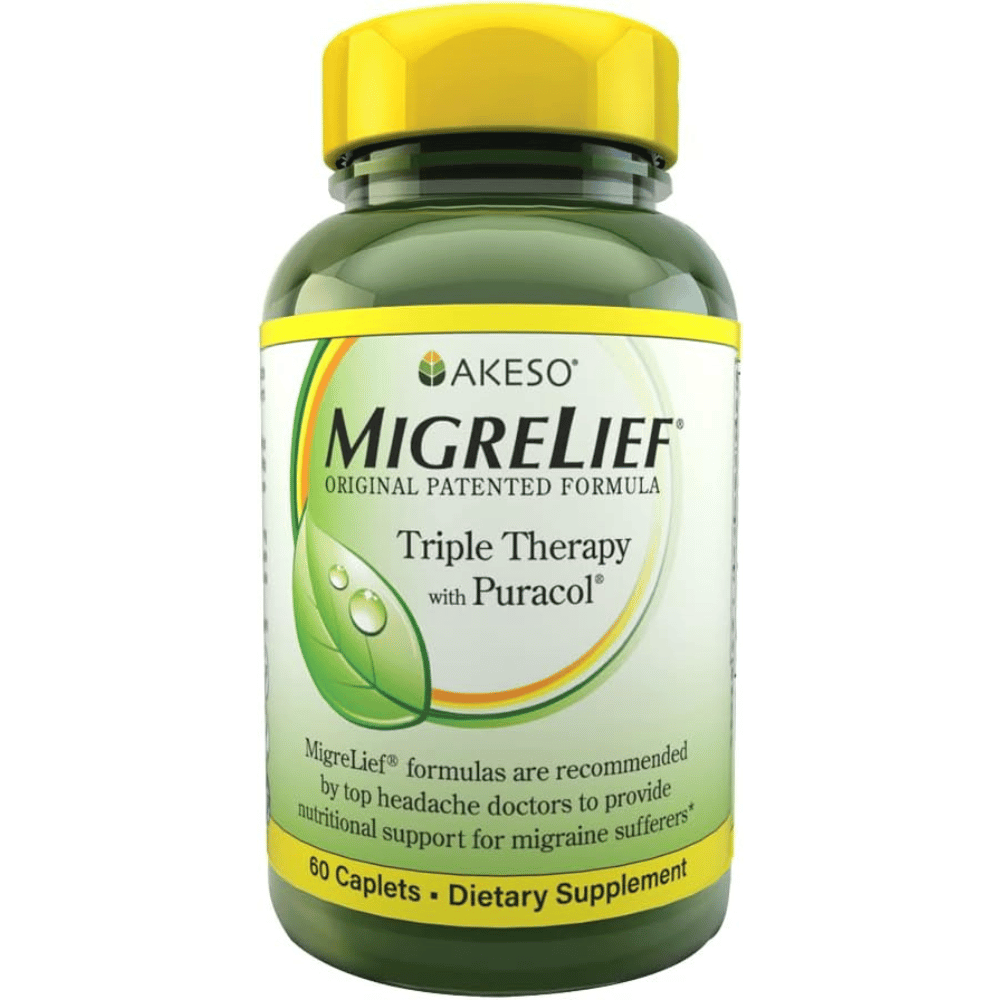
MigreLief Original Triple Therapy with Puracol
Recommended by neurologists and headache specialists for over 25 years.
MigRelief has become a beacon of hope for many migraine sufferers, offering a triple therapy approach that includes magnesium as a cornerstone ingredient.
Key Benefits:
- Combines magnesium with riboflavin and feverfew for comprehensive support.
- Formulated to provide nutritional support that targets the root causes of migraines.
- Trusted by neurologists and headache specialists.
Customer Review:
"Since I started taking MigRelief, my migraines have decreased significantly. I went from having almost daily headaches to just a few a month. It's been a lifesaver!"
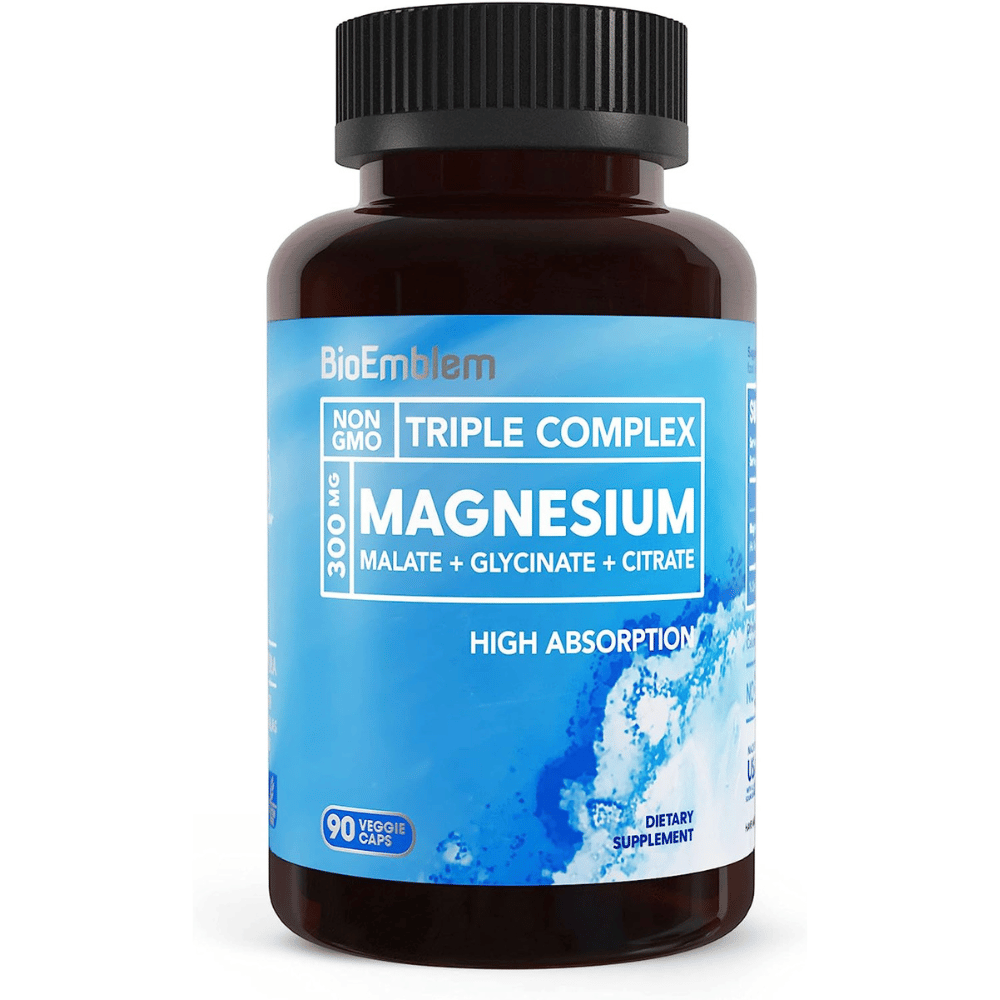
BioEmblem Triple Magnesium Complex
Made in the USA at a NSF-registered cGMP facility and is 3rd party tested for purity and accuracy.
BioEmblem's Triple Magnesium Complex offers a potent blend of magnesium forms, ensuring maximum absorption and effectiveness for migraine relief.
Key Benefits:
- Includes magnesium glycinate, malate, and citrate for optimal benefits.
- Non-GMO, vegan, and contains no fillers or artificial ingredients.
- Manufactured in the USA in a NSF-certified facility.
Customer Review:
"I've tried many supplements, but BioEmblem's complex made a noticeable difference in my migraine frequency and severity. Plus, it's gentle on my stomach."
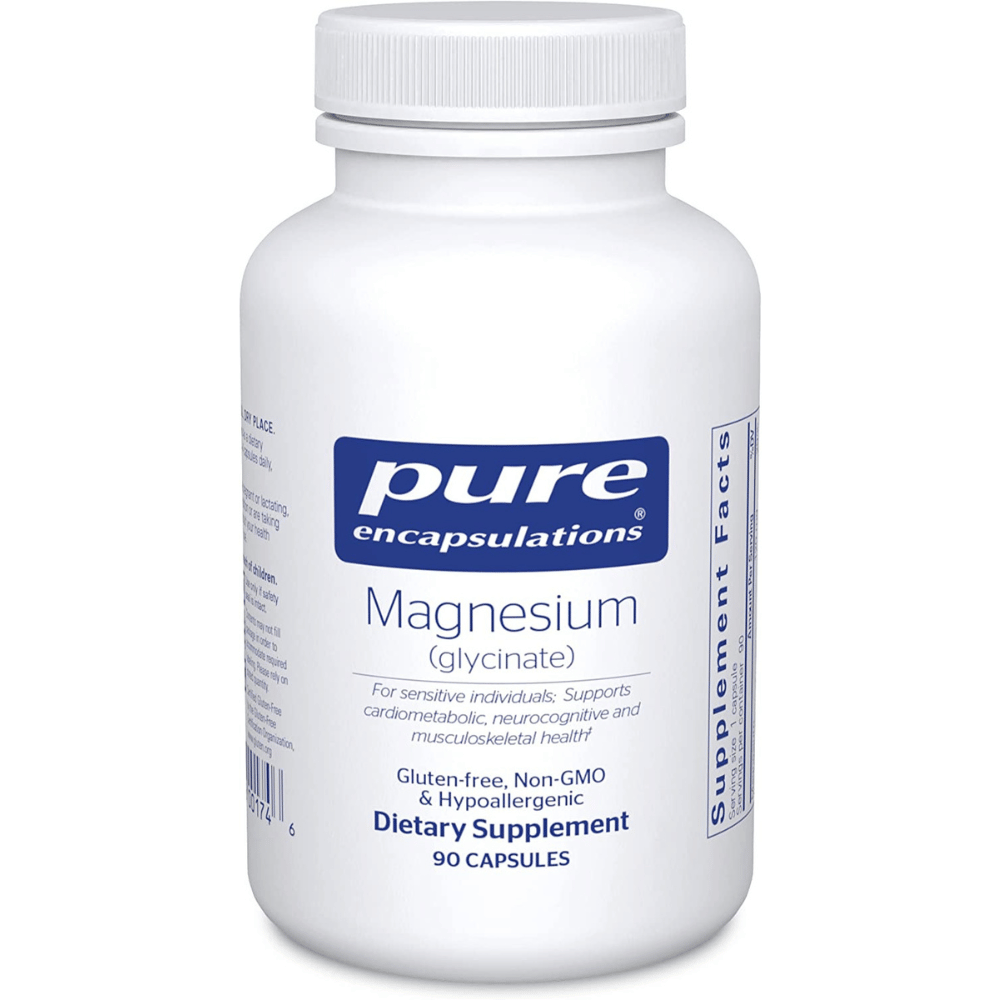
Pure Encapsulations Magnesium (Glycinate)
Free from common allergens, artificial or unnecessary ingredients, and GMOs.
Pure Encapsulations offers a hypoallergenic magnesium glycinate supplement that's highly bioavailable, making it an excellent choice for migraine prevention.
Key Benefits:
- Supports muscle relaxation and nervous system health, which can reduce migraine triggers.
- Free from wheat, gluten, eggs, peanuts, and several other common allergens.
- Provides 120 mg of magnesium glycinate per capsule.
Customer Review:
"Pure Encapsulations' magnesium has been a game-changer for my migraines. I've noticed a dramatic decrease in intensity and frequency since I started taking it."
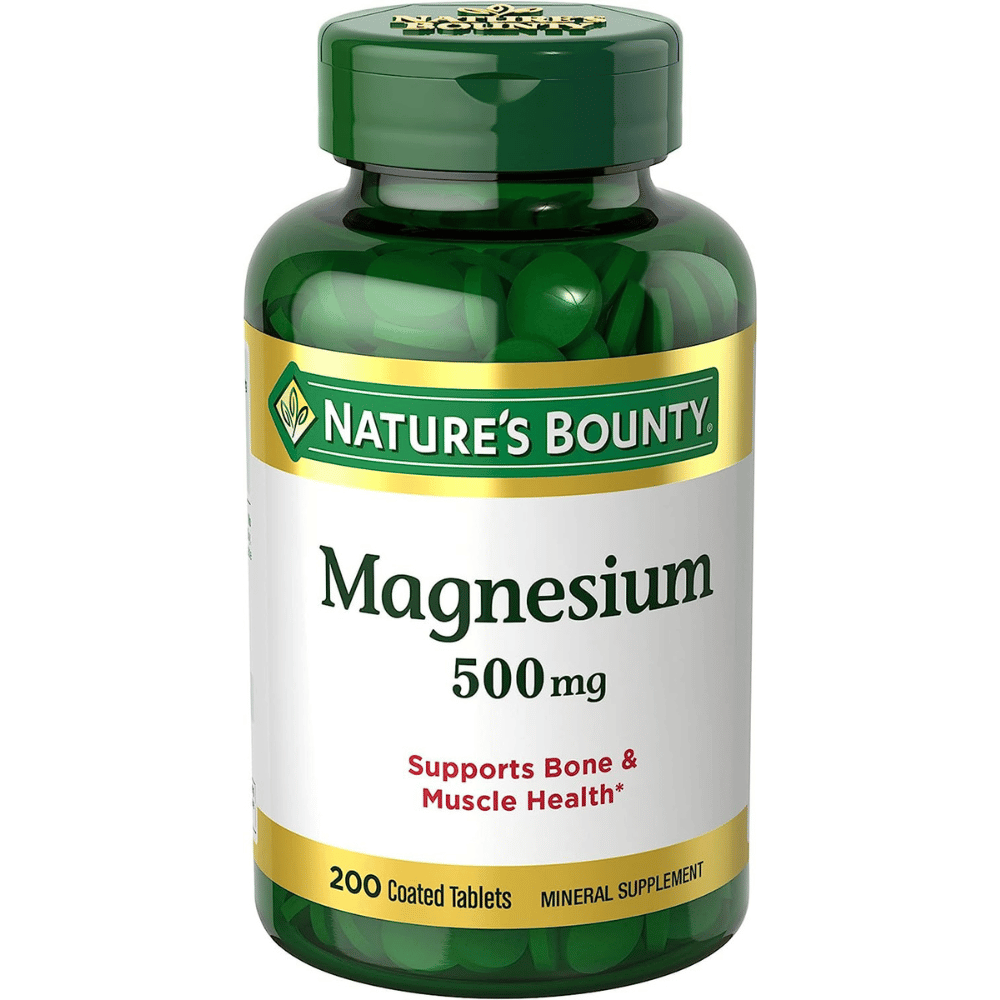
Nature's Bounty Magnesium
Blends the best of nature with the latest in science and nutritional innovation.
Nature's Bounty provides an affordable and effective magnesium supplement that's easy to find and can aid in reducing migraine occurrences.
Key Benefits:
- Each tablet contains 500 mg of magnesium, supporting nerve and muscle function.
- Manufactured in the USA with ingredients from around the world.
- Suitable for vegetarians and free of artificial colors, flavors, and sweeteners.
Customer Review:
"Nature's Bounty Magnesium is not only budget-friendly but also incredibly effective. My migraines have become much less frequent since I added it to my routine."
Solgar's Chelated Magnesium is designed for enhanced absorption, which can be particularly beneficial for those using magnesium to combat migraines.
Key Benefits:
- Utilizes a patented, highly absorbable form of magnesium.
- Free from gluten, wheat, dairy, soy, yeast, sugar, and sodium.
- Suitable for vegans and vegetarians.
Customer Review:
"I've been using Solgar's Chelated Magnesium for my migraines, and it's made a significant difference. I also appreciate that it's gentle on my digestive system."
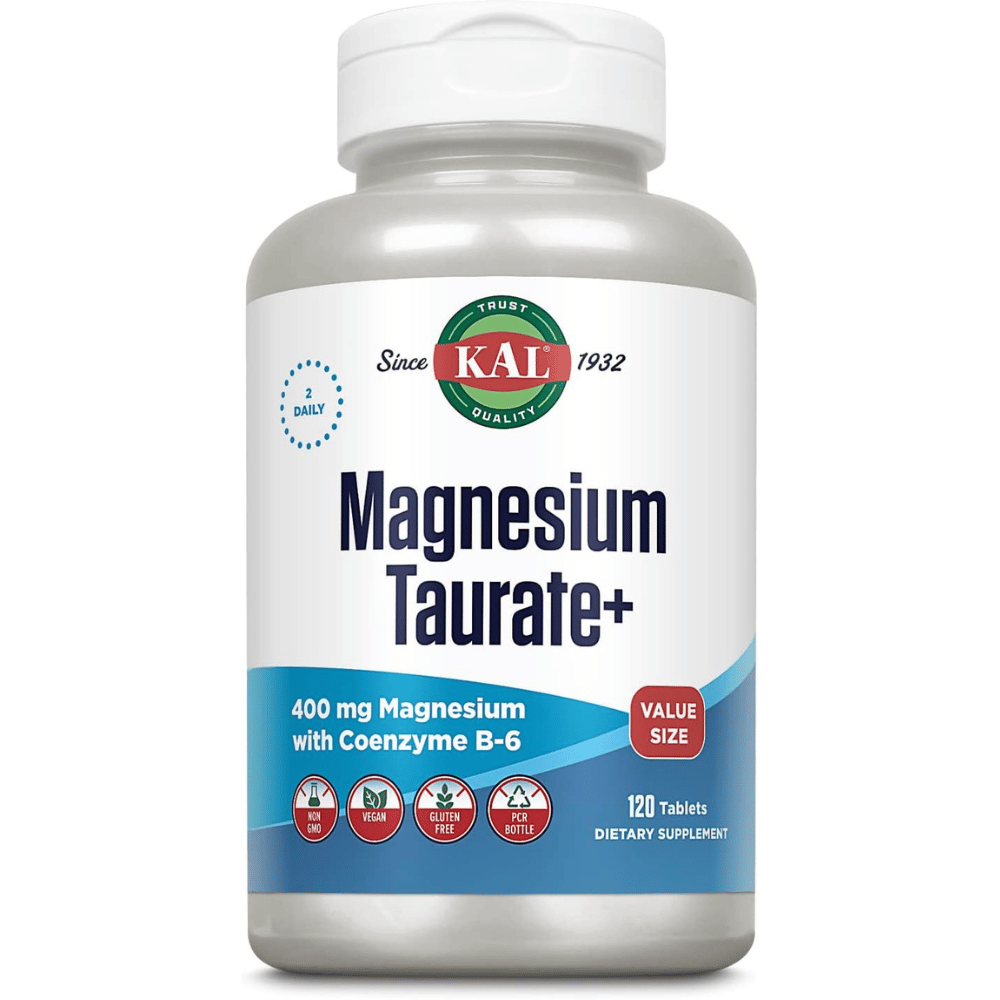
KAL Magnesium Taurate
Gluten-free, made without soy or dairy, and lab-verified for purity.
AL's Magnesium Taurate+ is a unique formula that combines magnesium with taurine, an amino acid that may enhance the effectiveness of magnesium for migraine relief.
Key Benefits:
- Provides a synergistic blend that supports cardiovascular health and nerve function.
- The taurate form is believed to be particularly beneficial for brain health.
- Vegan-friendly and free from common allergens.
Customer Review:
"KAL's Magnesium Taurate+ has been a crucial part of my migraine management plan. The combination seems to work better for me than magnesium alone."
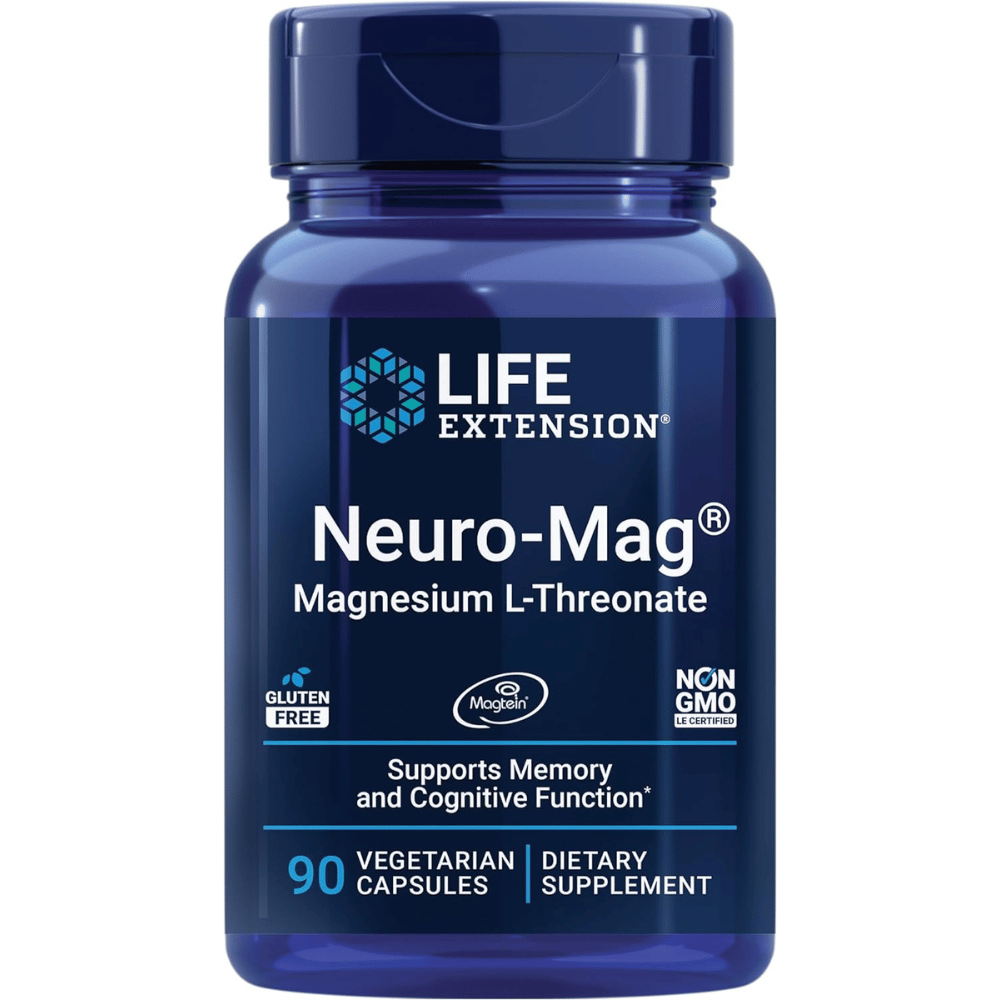
Life Extension Neuro-mag Magnesium L-Threonate
Sourced using only the finest raw ingredients.
Life Extension's Neuro-Mag Magnesium L-Threonate targets the brain more directly, which could offer specific benefits for migraine sufferers.
Key Benefits:
- Utilizes a form of magnesium shown to effectively raise the brain's magnesium levels.
- May support cognitive function and brain health, potentially reducing migraine triggers.
- Non-GMO and gluten-free.
Customer Review:
"Neuro-Mag has not only helped with my migraines, but I also feel like my memory and focus have improved. It's been an unexpected but welcome bonus."
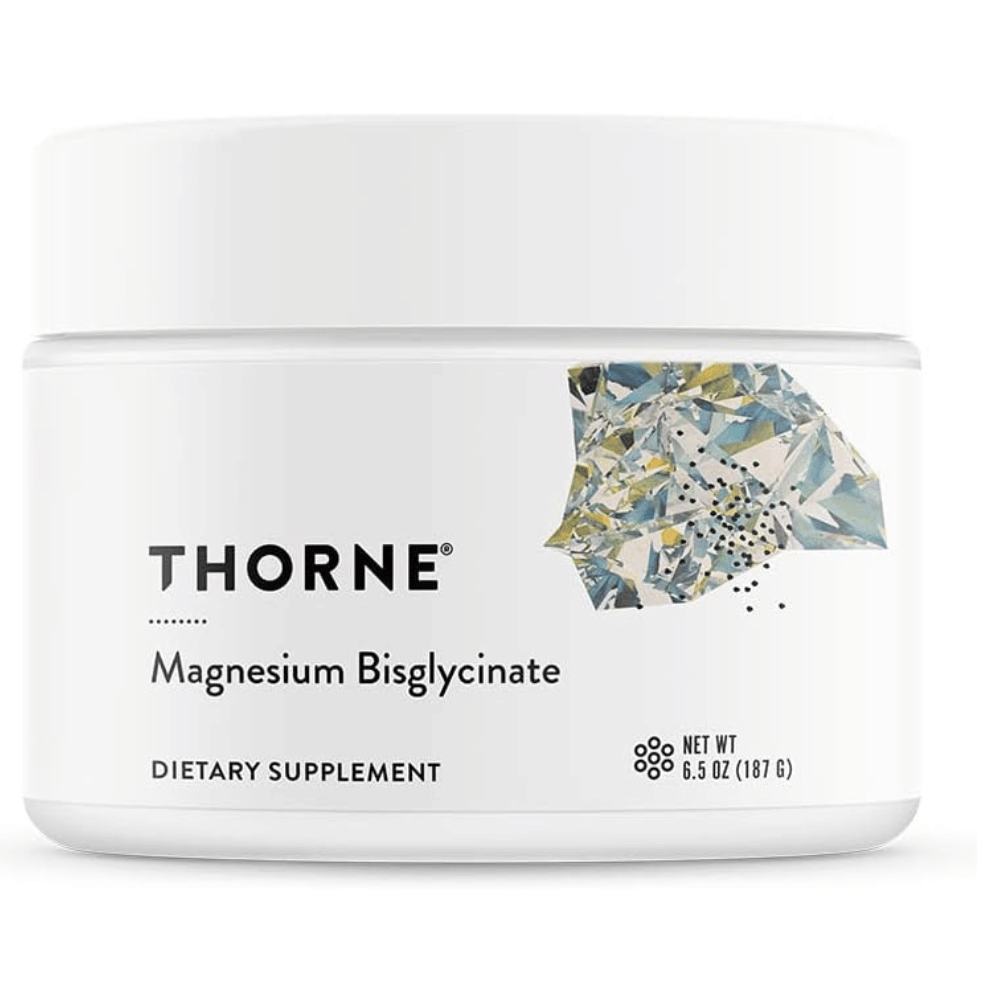
Thorne Magnesium Bisglycinate
Supports high-performance nutrition programs and is NSF Certified for Sports.
Thorne Research's Magnesium Bisglycinate offers a gentle yet effective form of magnesium, ideal for those who need a migraine-preventative supplement that's easy on the stomach.
Key Benefits:
- Provides a high dose of magnesium in a form that minimizes laxative effects.
- Supports stress reduction, which can be a trigger for migraines.
- Free of major allergens and artificial additives.
Customer Review:
"Thorne's Magnesium Bisglycinate has been fantastic. I've experienced fewer migraines, and when they do occur, they're less severe."
NOW Foods delivers a high-quality magnesium citrate supplement that's both effective for migraine prevention and supports overall health.
Key Benefits:
- Offers 400 mg of magnesium citrate per serving, known for its superior absorption.
- Manufactured in a GMP quality-assured facility.
- Vegan, kosher, and free of GMOs.
Customer Review:
"Since adding NOW's Magnesium Citrate to my daily regimen, my migraines have become much more manageable. It's a staple in my supplement cabinet now."
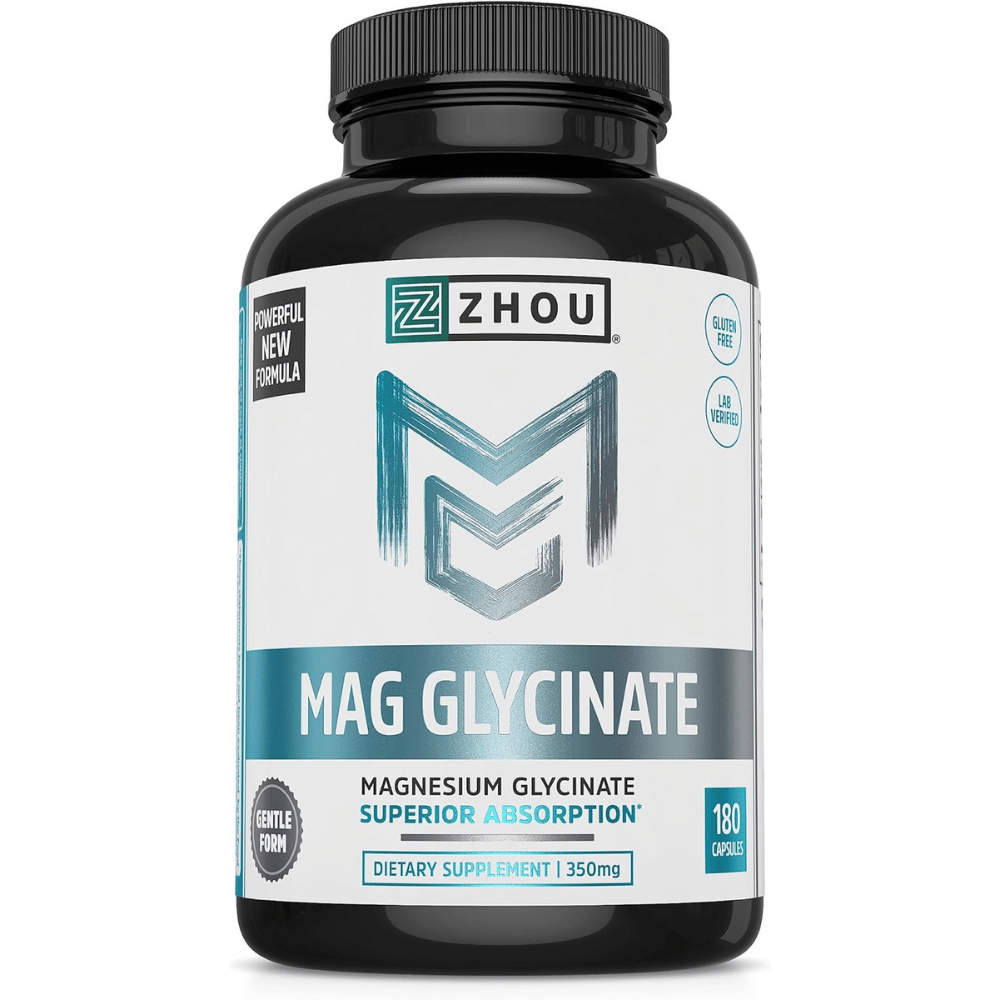
Zhou Magnesium Glycinate Complex
Formulated with glycine to be easier on your stomach.
Zhou Nutrition's Mag Glycinate provides a highly bioavailable form of magnesium that's specifically designed to be gentle on the stomach and effective for migraine prevention.
Key Benefits:
- Aids in calming the nervous system, which can help prevent migraine attacks.
- Free from soy, gluten, and dairy, catering to those with dietary restrictions.
- Offers 450 mg of magnesium glycinate per serving.
Customer Review:
"Zhou's Mag Glycinate has been a godsend for my chronic migraines. It's the only supplement that has made a noticeable difference without upsetting my stomach."
Summary
Magnesium supplementation offers a promising avenue for migraine relief and prevention. Among the various forms available, magnesium glycinate, citrate, and threonate stand out for their bioavailability and specific benefits related to migraine symptoms. It is crucial to select a high-quality supplement, adhere to the recommended dosage, and consult with a healthcare provider to tailor the supplement regimen to individual needs. With the right approach, magnesium can be a powerful ally in the fight against migraines.
FAQ Section
Q: Can magnesium supplements cure migraines? A: While magnesium supplements cannot cure migraines, they can significantly reduce the frequency and severity of migraine attacks when used as part of a comprehensive migraine management plan.
Q: Are there any risks associated with taking magnesium for migraines? A: Taking magnesium supplements is generally safe, but high doses can lead to side effects such as gastrointestinal discomfort. It is important to follow the recommended dosage and consult with a healthcare provider, especially for individuals with kidney issues or those taking other medications.
Q: How long does it take for magnesium supplements to affect migraines? A: The effects of magnesium supplementation on migraines can vary from person to person. Some may notice improvements within a few weeks, while for others, it may take several months of consistent use to see a significant reduction in migraine frequency and intensity.



